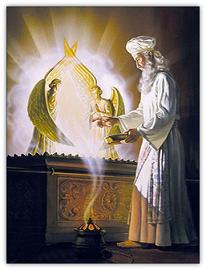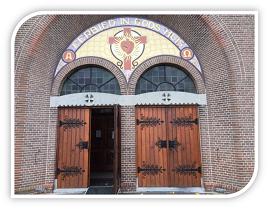The Confession of Faith Article 25 The Abolishing of the Ceremonial Law
The Confession of Faith Article 25 The Abolishing of the Ceremonial Law
When the Lord established His covenant with Israel, He gave them the Law at Mount Sinai. This Law was the rule of conduct for the children of Israel in all things. The laws which the Lord gave there were of three kinds, the Moral Law, the Civil Law, and the Ceremonial Law.
The Moral Law, of the Ten Commandments, is an everlasting law. This was already evident when it was given, for it was written in two tables of stone. This did not take place when the other two laws were given, and thus the Lord manifested the everlasting character of these ten commandments. We do find some ceremonial things in this law, as for example the Sabbath, but it is definitely not for the Jews only, but for the whole world unto the end of time. This was also explained by the Lord Jesus Himself, when He said, "Think not that I am come to destroy the Law, or the prophets: I am not come to destroy, but to fulfill."
The second law which we mentioned is the civil law, and concerns the civil and political life of Israel. Israel was a theocracy, which means that it was ruled immediately by the Lord. He was Israel's God, King, Lawgiver and Judge. Him they had to obey in days of peace and in time of war, in prosperity and adversity, and they were to act according to His will. When Israel was no longer a nation (which became reality in the year 70), these laws were no longer in force.
But this article speaks particularly about the ceremonial law. These were the laws of Israel's religious life. Everything therein was dictated by the Lord; it was not a human institution, but, a commandment of the Lord, was in force during the time of the Old Testament for the children of Israel. It also contained much instruction for them. But why only under the Old Testament times? It was the time that the Lord Jesus had not yet come, but His people were waiting for Him, as He had been promised. These ceremonial laws point to Christ and explain His work. They are a visible instruction for Israel by the Lord, and they tell about the sacred persons, places, seasons and things. We will try to explain these briefly.
 Among the sacred persons, we think first of the High Priest. His title already testifies that he is the head of the priests. His office was to do the most holy work, as we can find in Exodus 28, Leviticus 8 and Numbers 16. Next we mention the priests, who explain the law, bring the offerings, pray for the people and bless them in the Name of the Lord. Then follows the Levites, who served in the sanctuary in the place of the firstborn. As you will recall, the Lord required the sanctification of the firstborn in His service after the angel of destruction had gone through Egypt. The firstborn belonged to the Lord. However, at Sinai only the tribe of Levi was faithful to the Lord and had not danced around the golden calf. At that time this tribe of Levi was appointed by the Lord to serve in the sanctuary in place of the firstborn. (Numbers 3:12).
Among the sacred persons, we think first of the High Priest. His title already testifies that he is the head of the priests. His office was to do the most holy work, as we can find in Exodus 28, Leviticus 8 and Numbers 16. Next we mention the priests, who explain the law, bring the offerings, pray for the people and bless them in the Name of the Lord. Then follows the Levites, who served in the sanctuary in the place of the firstborn. As you will recall, the Lord required the sanctification of the firstborn in His service after the angel of destruction had gone through Egypt. The firstborn belonged to the Lord. However, at Sinai only the tribe of Levi was faithful to the Lord and had not danced around the golden calf. At that time this tribe of Levi was appointed by the Lord to serve in the sanctuary in place of the firstborn. (Numbers 3:12).
God's Word speaks of the Gershonites, the Kohathites and the Merarites; according to Numbers 3 they each had a different task. There is also spoken of the Nethinims, who originally were the inhabitants of Gibeon. They deceived Joshua and the people, and a covenant was made with them without asking the Lord. Thereafter they had to cut wood and bring water to the tabernacle. Thus we find in the ceremonial law a complete program regarding the duties of the sacred persons. Where was their work to be done? In those sacred places, of which the ceremonial law also speaks.
What were the sacred places? According to the commandment of the Lord, Moses made a tabernacle in the desert; it was divided into three parts – the most holy place or the holy of holies, the holy place and the court. Only the High Priest was allowed to once a year enter the most holy place. As he entered, he must close the veil behind him and no priest was allowed to be in the holy place, because the Lord had strictly forbidden that even one glance be cast into the holy of holies. It means that man cannot exist before a holy and righteous God; a sacrifice had to be brought before one can appear before Him.
The priests daily entered the holy place, and in the court the sacrifices were brought. The Israelites came to the sanctuary to bring their sacrifices for (ceremonial) atonement, especially at the time of the three great feasts each year. All these things were described by the Lord in the ceremonial laws.
The three great feasts were among the sacred times which were appointed for the children of Israel. Each morning and each evening an animal was offered to the Lord, but prayer was then also sent up to Him. Each sabbath was sanctified to the Lord; and also on the first day of the new month and on the day of the new moon no work was done.
In our life do we each morning and evening draw nigh to the Lord? Do we begin our day and end our day with the Lord? I am so afraid that our lives are offered more to the Moloch of this world than to the Lord. Especially the Sunday is not observed as the Lord's Day, but is become more and more a day of visits rather than of serving the Lord. May the Holy Spirit work the necessary change among us.
The ceremonial laws also speak about the great feasts of Israel, namely, Passover, Pentecost, and the Feast of Tabernacles. The Passover was held on the fourteenth day of the month Nizan, which is around the first of April. On that day Israel remembered how the Lord had delivered them out of Egypt. All the first born of the Egyptians had died, but the Israelites were safe behind the blood. This feast pointed to Christ, Who would work out the true deliverance from the hellish Pharaoh, and would go as a lamb to the slaughter. It was also the beginning of the harvest; the people were not allowed to eat of the new harvest prior to the Passover. This is our Easter.
 Pentecost was held fifty days after Passover and is also called the feast of weeks. Passover was the beginning of the harvest, while Pentecost was the end. On this day two bread, baked from the new harvest, were brought before the Lord. Israel also remembered that they had received the Law from Sinai on that occasion, and we commemorate the outpouring of the Holy Spirit.
Pentecost was held fifty days after Passover and is also called the feast of weeks. Passover was the beginning of the harvest, while Pentecost was the end. On this day two bread, baked from the new harvest, were brought before the Lord. Israel also remembered that they had received the Law from Sinai on that occasion, and we commemorate the outpouring of the Holy Spirit.
The feast of Tabernacles at the end of the year was the third great feast of the Israelites and lasted seven days. During those days Israel lived in tabernacles made of branches to remember the wandering of their fathers in the desert from Egypt to Canaan. Great thankfulness was also shown to the Lord for the blessings bestowed upon them in the land of Canaan. We can compare this feast to our Thanksgiving Day.
There were also smaller feasts which they observed, such as the day of blowing of trumpets, which would be comparable to our New Year, (Number 29:1). Another is the Day of Atonement, at which time atonement was made for sin, (Leviticus 23:26-31). A third is the Sabbath Year, during which the whole country must rest. In that year they were not allowed to sow or to harvest. And the last one we will mention is the Year of Jubilee. Then all the slaves were freed and all the possessions given back to their brothers who had been forced to sell because of poverty. You can understand that many Israelites were anxiously awaiting the beginning of that year. All these things the Lord had described in the Ceremonial Law.
The Ceremonial Law also spoke of sacred things, which included all kinds of offerings to be brought before the Lord. Each offering, such as burnt, sin, thank and cleansing offerings, was brought under different circumstances. When an animal died in the place of a sinner, it pointed to Christ, Who was yet to come. In Colossians 2:17 Paul, speaking about the ceremonial law, says "Which are a shadow of things to come." However, when Christ was come, they no longer have any power. This is also the meaning of this article. It seems to be very simple, but it has in the past given many problems. The article says, "We believe, that the ceremonies and figures of the law ceased at the coming of Christ, and that all the shadows are accomplished; so that the use of them must be abolished amongst Christians." Since everything of the Ceremonial Law is fulfilled in Christ, they are no longer in use. In essence the Old and New Testaments are both the same, as both speak of the grace by and in Christ. We may not say that we don't need the Old Testament any longer, because both are God's Word and are one. However, the form is different; the Old Testament is the promise, and the New Testament is the fulfillment of the promise in Christ.
Several prophets had foretold that the Ceremonial Law would not remain for ever. In Isaiah 19:19 we read, "In that day shall there be an altar to the Lord in the midst of the land of Egypt, and a pillar at the border thereof to the Lord." In Jeremiah 3:16 there is written that the time will come when the tabernacle will no longer be visible in Israel, and in Daniel 9:27 that the Lord shall cause the sacrifice and oblation to cease. The Apostle Paul spoke very clearly of these things in Galatians 4:3-5, "Even so we, when we were children, were in bondage under the elements of the world: but when the fulness of the time was come, God sent forth His Son, made of a woman, made under the law, to redeem them that were under the law, that we might receive the adoption of sons." This is a testimony that the Ceremonial Law came to an end.
The Lord Himself has broken down the middle wall of partition between Jews and heathens. At the Synod in Jerusalem this matter was spoken about (Acts 15:10), and Peter said, "Now therefore why tempt ye God, to put a yoke upon the neck of the disciples, which neither our fathers nor we were able to bear?" The Lord Jesus Himself has shown the way in this, when in John 4:23-24 He said, "But the hour cometh, and now is, when the true worshippers shall worship the Father in spirit and in truth: for the Father seeketh such to worship Him. God is a Spirit: and they that worship Him must worship Him in spirit and in truth." This also points to the end of the Ceremonial Law.
The decision of the Council at Jerusalem was maintained for some time, but later the church turned the wrong way. After this synod it was especially the Judaists who caused much trouble in the early Christian church. However, the struggle was even heavier against the doctrine of Rome, which gradually returned to the Ceremonial Law in many parts of their religion. Calvin says that the church of Rome imitates the Ceremonial Law as a monkey. The veil of the most holy place, rent when the Lord Jesus died, is repaired by Rome in their human institutions. In the Reformation the Lord delivered out of the house of bondage, although there also remained some differences between Luther and Calvin. Luther wanted to keep that which was not forbidden in God's Word, while Calvin and Zwingli wanted to keep only those things which God's Word commanded. In England it was John Knox who fought for the liberation of the church and the abolishing of the ceremonies. Many of their followers emigrated to North America.
In Holland there have been differences about the holy days, about the official robes and later on about the observance of the Sunday. Especially during the years 1658-72 there were many problems, since Cocceius taught that the fourth commandment is ceremonial and no longer necessary to be observed. For many it became a day of feasting, with only one church service; in harvest and haying time the people worked in the fields on Sunday, even the ministers. Voetius and Brakel, based upon the Word of God, fought against it with all their might. Gradually the consciences of the church people were awakened, and they began to understand that it was God's commandment to observe the Sunday, also under the New Testament.
 In our days our governments and people in general do not listen to God's Word, but go their own way. Many things are done on Sunday, which previously were not allowed. We think only of visiting each other on Sunday and going on holidays on that day, so that there is no possibility to go up to God's house and the time, or a major part of it, is spent in the world. That must be condemned, as it will lead to a complete break with God's day. When we have company on Sunday, what, in general, is spoken about? Is it not the world? It is a means of the devil to pick away the seed. It is against the fourth commandment!
In our days our governments and people in general do not listen to God's Word, but go their own way. Many things are done on Sunday, which previously were not allowed. We think only of visiting each other on Sunday and going on holidays on that day, so that there is no possibility to go up to God's house and the time, or a major part of it, is spent in the world. That must be condemned, as it will lead to a complete break with God's day. When we have company on Sunday, what, in general, is spoken about? Is it not the world? It is a means of the devil to pick away the seed. It is against the fourth commandment!
We read further in the article, "So that the use of them must be abolished amongst Christians; yet the truth and substance of them remain with us in Jesus Christ." This does not mean that a part of the Old Testament no longer has value for us. In our dispensation we must also read and consult the Old Testament Books of the Bible. This was done by the Lord Jesus when He spoke of His own sacrifice, work and person. The apostles very often used the Old Testament to defend their doctrine. We must live according to the Spirit of the Old Testament, which was to the honor of God; and this is the same in both the Old and New Testaments.
When we say that the shadow of the law came to an end, it does not mean that the law is no longer a rule in the life of a Christian. The law explains God's will to us. Out of the law we know our misery, but it is also a schoolmaster to bring us to Christ, and this under the administration of the Holy Ghost, as it is His special work to glorify Christ.
Is this also found in us? Do we seek the honor of God, or is it a burden to keep the law of God? I wish that there would come a time in your life that you felt the responsibility of keeping the law and it became a burden too heavy to carry any longer. Then a crying would be born for that Mediator Who is very God and real righteous man. He has fulfilled everything which is necessary to the salvation of His church.

Add new comment